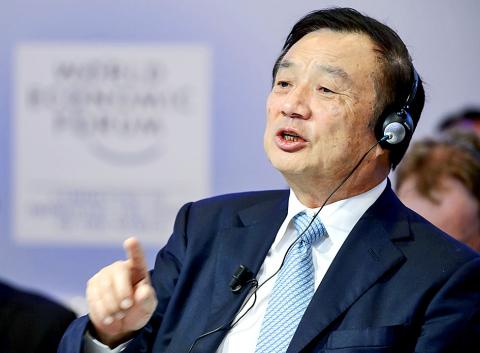The founder of Chinese telecom giant Huawei Technologies Co (華為) has hit back at US efforts to blacklist the company, saying defiantly that the world cannot do without Huawei and its “more advanced” technology.
“There’s no way the US can crush us,” Ren Zhengfei (任正非) said in an interview with the BBC. “The world cannot leave us, because we are more advanced.”
Ren, 74, also denounced as “politically motivated” the December arrest of his daughter, Huawei chief financial officer Meng Wanzhou (孟晚舟), who is accused of breaching US sanctions against Iran and faces an extradition hearing in Canada next month.

Photo: AFP
“We object to this,” he said.
“But now that we’ve gone down this path, we’ll let the courts settle it,” he added.
The normally media-shy Huawei founder has been forced to step into the limelight in the past few months as the company has come under increasing pressure over espionage concerns and the US-led campaign to persuade other countries to ban its technology.
Last year, security concerns prompted Australia to ban Huawei equipment from its future 5G network.
US prosecutors are also charging Huawei with stealing trade secrets, saying it offered rewards to employees for stealing technology from rivals.
Ren shrugged off the growing pressure.
“If the lights go out in the West, the East will still shine,” he said. “America doesn’t represent the world.”
“Even if they persuade more countries not to use us temporarily, we can always downsize and become smaller,” he said.
Signs that US efforts to convince its allies to shun Huawei technology could fall through are also growing.
British intelligence concluded that security risks posed by using Huawei’s 5G equipment can be managed, the Financial Times reported on Monday.
“Other nations can make the argument that if the British are confident of mitigation against national security threats, then they can also reassure their publics and the US administration that they are acting in a prudent manner to allow their telecommunications service providers to use Chinese components,” an unnamed source told the newspaper.
Ren said Huawei might reallocate investments it had planned for the US to the UK.
“We still trust in the UK, and we hope that the UK will trust us even more,” he told the BBC. “We will invest even more in the UK because if the US doesn’t trust us, then we will shift our investment from the US to the UK on an even bigger scale.”
Additional reporting by Bloomberg

The Central Election Commission has amended election and recall regulations to require elected office candidates to provide proof that they have no Chinese citizenship, a Cabinet report said. The commission on Oct. 29 last year revised the Measures for the Permission of Family-based Residence, Long-term Residence and Settlement of People from the Mainland Area in the Taiwan Area (大陸地區人民在台灣地區依親居留長期居留或定居許可辦法), the Executive Yuan said in a report it submitted to the legislature for review. The revision requires Chinese citizens applying for permanent residency to submit notarial documents showing that they have lost their Chinese household record and have renounced — or have never

A magnitude 5.6 earthquake struck off the coast of Yilan County at 12:37pm today, with clear shaking felt across much of northern Taiwan. There were no immediate reports of damage. The epicenter of the quake was 16.9km east-southeast of Yilan County Hall offshore at a depth of 66.8km, Central Weather Administration (CWA) data showed. The maximum intensity registered at a 4 in Yilan County’s Nanao Township (南澳) on Taiwan’s seven-tier scale. Other parts of Yilan, as well as certain areas of Hualien County, Taipei, New Taipei City, Taoyuan, Hsinchu County, Taichung and Miaoli County, recorded intensities of 3. Residents of Yilan County and Taipei received

Taiwan has secured another breakthrough in fruit exports, with jujubes, dragon fruit and lychees approved for shipment to the EU, the Ministry of Agriculture said yesterday. The Animal and Plant Health Inspection Agency on Thursday received formal notification of the approval from the EU, the ministry said, adding that the decision was expected to expand Taiwanese fruit producers’ access to high-end European markets. Taiwan exported 126 tonnes of lychees last year, valued at US$1.48 million, with Japan accounting for 102 tonnes. Other export destinations included New Zealand, Hong Kong, the US and Australia, ministry data showed. Jujube exports totaled 103 tonnes, valued at

BIG SPENDERS: Foreign investors bought the most Taiwan equities since 2005, signaling confidence that an AI boom would continue to benefit chipmakers Taiwan Semiconductor Manufacturing Co’s (TSMC, 台積電) market capitalization swelled to US$2 trillion for the first time following a 4.25 percent rally in its American depositary receipts (ADR) overnight, putting the world’s biggest contract chipmaker sixth on the list of the world’s biggest companies by market capitalization, just behind Amazon.com Inc. The site CompaniesMarketcap.com ranked TSMC ahead of Saudi Aramco and Meta Platforms Inc. The Taiwanese company’s ADRs on Tuesday surged to US$385.75 on the New York Stock Exchange, as strong demand for artificial intelligence (AI) applications led to chip supply constraints and boost revenue growth to record-breaking levels. Each TSMC ADR represents